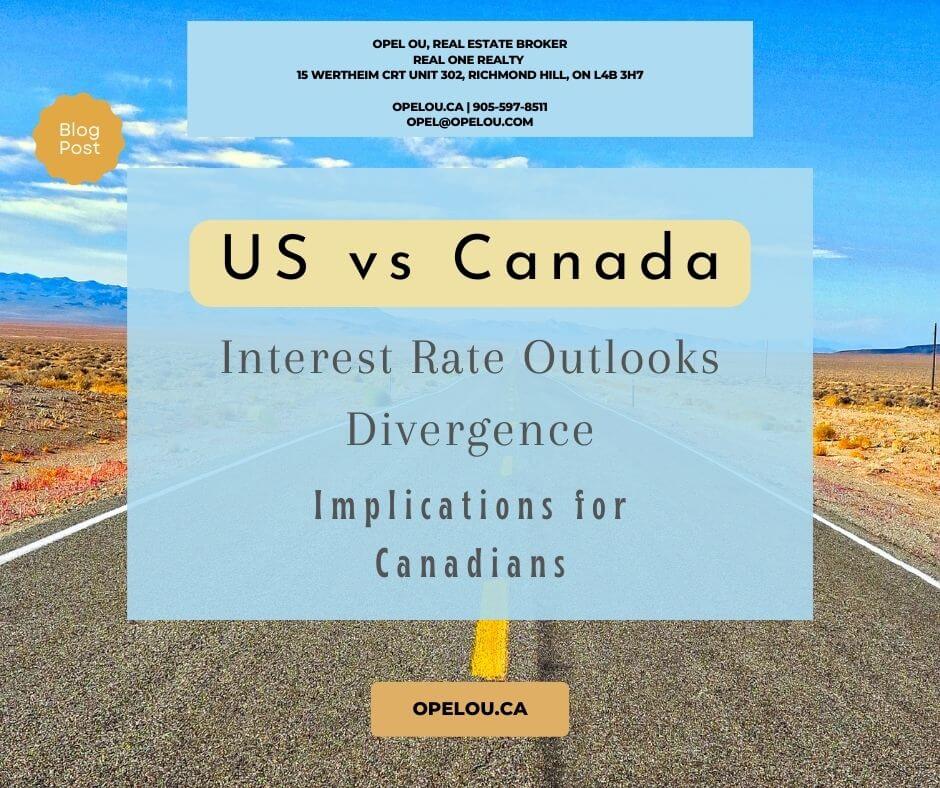Interest Rate Outlooks Divergence between Canada and the US: Implications for Canadians

US Fed Hikes Interest with Banking Industry Turmoil
The US Federal Reserve’s recent decision to raise its key interest rate by 25 basis point for the ninth consecutive time to 5% has drawn attention to the challenges facing the US economy and the central bank’s efforts to manage inflation. While the US Fed remains confident in the soundness and resilience of the US banking system, concerns remain about the impact of higher borrowing rates on weaker banks and their nervous customers in the US. Read the post on CBC: U.S. central bank raises interest rate another 25 points – Move marks U.S. Federal Reserve’s ninth consecutive rate hike to fight inflation
Economic Challenges Canada Faces
In contrast, Bank of Canada officials have recently announced that they did not actively consider raising interest rates in early March, citing their confidence in the outlook that inflation would continue to ease as monetary policy tightening works its way through the economy. While the Bank of Canada has reiterated its willingness to hike rates again if needed, it is expected to remain cautious and forward-looking in its decision-making.
Resale Market and Rental Market
The Bank of Canada’s decision to keep interest rates on hold could have a significant impact on the rental market across the country. Experts in the real estate industry believe that the pause in interest rate hikes after eight consecutive increases is expected to encourage home buyers back into the resale home market, reducing demand for rental units and slowing the rise in rent prices. BNN Bloomberg: Rent prices likely to plateau amid Bank of Canada rate pause: Experts
However, in the long term, many regions in Canada will continue to face supply shortages, which will keep rental prices elevated as the population grows. To address these ongoing supply issues and affordability challenges faced by many Canadians seeking housing, a more significant effort is needed to bring more housing units to the market.
Cost of Mortgage
The impact of rising interest rates on Canadians will be greater compared to Americans due to the difference in mortgage terms. Canadian mortgage terms are negotiated for a specific length of time, ranging from 6 months to 10 years, with new terms and interest rates negotiated at the end of each term. US mortgages do not require renegotiation during the term and can have fixed or adjustable rates, with payments remaining the same for fixed rates and adjusting annually for adjustable rates. Most Canadian mortgages have a term of 5 years or less, while in the United States, it is 30 years. According to Goldman Sachs, 99 percent of U.S. mortgages have interest rates below current market rates. This will lead to a bigger impact on the Canadian economy and inflation. The negative GDP print in Canada for December confirms this, while the U.S. GDP is still growing. As a result, the Bank of Canada is likely to avoid increasing rates while the U.S. will likely continue, which could add further pressure on the Canadian dollar.
Weak Canadian Dollar
The Canadian dollar is expected to remain weaker for some time due to three key factors. Firstly, an unstable federal government and ongoing scandals reduce confidence in foreign investors and the dollar. Secondly, shorter-term mortgages in Canada make rising interest rates have a bigger impact on the economy and inflation than in the US. Lastly, land-locking energy policies and reduced capital inflows have delinked the dollar from oil prices, which previously provided a huge support to the currency. The heavily resource-weighted S&P/TSX composite index is expected to outperform the tech-heavy S&P 500 in the future, but this may not boost the Canadian dollar significantly. The weaker Canadian dollar may hurt Canadians when traveling or purchasing goods in other currencies. Read the article from Financial Post: 3 factors affecting our currency that will hurt Canadians for years to come.
Conclusion
In conclusion, the US Federal Reserve’s decision to raise its key interest rate for the ninth consecutive time has highlighted the challenges facing the US economy, while the Bank of Canada has opted to keep its rates steady. The decision is expected to impact the rental market in Canada by encouraging home buyers back into the resale market, but in the long term, supply shortages will keep rental prices high. Rising interest rates are expected to have a bigger impact on the Canadian economy and inflation than the US due to the difference in mortgage terms. This, combined with reduced capital inflows, is expected to keep the Canadian dollar weak for some time.
#USFederalReserve #InterestRateHike #Inflation #BankOfCanada #MonetaryPolicy #RentalMarket #HousingSupply #MortgageRates #CanadianDollar #GDP #RealEstate #Canada #US